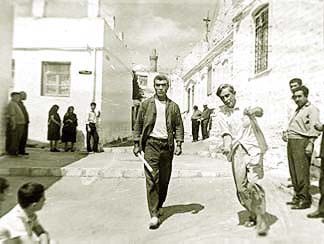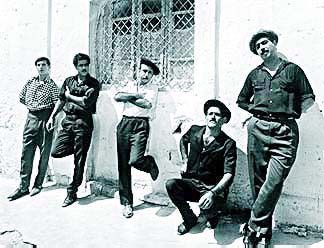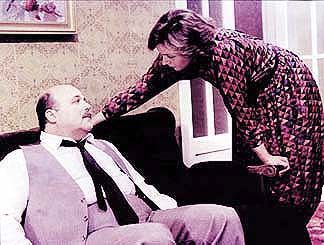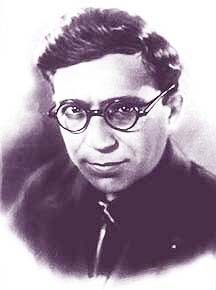|

Autumn 1997 (5.3)
Pages 21-23
Cinema and Censorship
A Glimpse
of the Former Soviet Union
Conversation with
Screenwriter Rustam Ibrahimbeyov
by Betty Blair
See also:
Famous People: Then and Now - Rustam
Ibrahimbeyov
Burnt
by the Sun - Winner of Oscar
Rustam Ibrahimbeyov (pronounced roo-STAM ee-brah-him-BEH-yov)
has been one of the driving forces in cinematography in Azerbaijan
since the late 1960s. A renowned screenwriter, he currently heads
the Filmmakers' Union of Azerbaijan as well as the Confederation
of Filmmakers' Union (CFU), which represents filmmakers from
all of the former Soviet republics. Unlike many other former
associations and institutions of the USSR, every single republic
has maintained strong ties with the CFU even after the demise
of the Soviet Union. A great deal of credit for this should go
to Rustam Ibrahimbeyov who currently serves as Acting Chair.
Rustam has written scripts for more than 30 films, most of which
have been produced and many of which are widely acclaimed. "In
a Southern City" (directed by Eldar Kuliyev, 1969) was the
first film to raise serious moral issues about the Soviet system.
"White Sun of the Desert" (directed by Vladimir Motyl,
1969) is legendary, and Russian cosmonauts consider it a good
omen to watch before they prepare for a launch.
 |
 |
Above: Scenes from "In a Southern Town"
(Bir Janub Shaharinda), Eldar Guliyev (director), Rustam Ibrahimbeyov
(screenwriter), 1969. One of the first films ever produced in
the Soviet Union to challenge the social-political establishment.
He has received numerous awards from the Soviet Union, and now
since the collapse of the Soviet Union (1991), he's been recognized
at international film festivals as well. All Union Prizes were
given for "White Sun of the Desert," "Interrogation"
(directed by Rasim Ojagov, 1979), "Double Life" (also
with Ojagov, 1987) and "Then I Said: No!" In 1990 the
Istanbul Film Festival awarded "Guard Me, My Talisman"
(directed by Roman Balayan) with the Golden Peacock Award. The
following year "Urga, Territory of Love" (directed
by Nikita Mikhalkov) and known in the U.S. as "Close to
Eden" won the Golden Lion Award in the Venice Film Festival
as well as the Felix Award in Berlin as Best European Film. "Close
to Eden" was also nominated for an Oscar in 1992 as Best
Foreign Film.
  Left: From "Another Life" (Ozga Omur), 1987.
Directed by Rasim Ojagov. Alexander Kalyagin plays Farid Rezayev
and Irina Kupchenko plays Lilia. Left: From "Another Life" (Ozga Omur), 1987.
Directed by Rasim Ojagov. Alexander Kalyagin plays Farid Rezayev
and Irina Kupchenko plays Lilia.
Rustam was involved with Nikita
Mikhalkov in all stages of the development of "Burnt by
the Sun" which had the distinguished honor of winning both
the Grand Prix at the Cannes Festival (1994) and Best Foreign
Film at Hollywood's Academy Awards (1995). That, in itself, is
a rare feat since popular tastes usually differ immensely between
North America and Europe.
"Urga" and "Burnt
by the Sun" received the Russian State Prize which
was presented by President Yeltsin in 1993 and 1996, respectively.
Rustam is currently juggling a variety of projects in numerous
locations around the world-Moscow, Baku and Los Angeles. Filming
for "Barber of Siberia" (directed by Mikhalkov, 1997)
was recently completed in Prague and is soon to be released.
Two of Rustam's screenplays are being used in American film projects
with the renown Australian director Vincent Ward and famous screenwriter
Don Jacoby. Oleg Safaraliyev is in preproduction with one of
Rustam's screenplays at Azerbaijan's national film company, Azerbaijanfilm.
A full feature film, "Mystery," is being shot in Georgia
under the direction of Mikhail Kalatozoshvili, and Evgeny Mitrofanov
is nearly ready to debut the low-budget film, "Don't Touch
Scorpio's Ears."
Despite Ibrahimbeyov's broad and successful international involvement
as a screenwriter, he remains deeply committed to his filmmaking
colleagues in Azerbaijan and to the revitalization of Azerbaijan's
film industry. As such, he has become both the catalyst and the
driving force to establish the Baku International Film Festival
which he hopes will premiere in the autumn of 1998 and become
a world-renown annual event.
The following conversation took
place between Rustam Ibrahimbeyov and Azerbaijan International's
Editor Betty Blair in Baku at the Cinematographers' Union in
June 1997.
_________
I'm interested in the problems that you experienced with censorship
during the Soviet period. In the West, we were always led to
believe that everything was controlled by Moscow, and that all
art forms, especially film, had to be intensely scrutinized and
"politically correct."
When it comes to censorship in the former Soviet Union, I've
had a lot of experience as I worked simultaneously in three artistic
areas-theater, literature and cinema. These represented three
distinct censorship systems in which the level of centralization
varied. Literature was the easiest to get cleared, since all
decisions were made on the level of the local publishing house.
In my experience, literary censors seemed most concerned about
disclosing information that might be considered military secrets.
However, restrictions imposed on movie makers were much more
stringent. Ultimately, you're right. The final decisions were
made in Moscow as this art form was considered the most powerful
tool for mass propaganda. Lenin once observed, "Cinema is
the most important of all arts."
Stalin, too, appreciated its significance. He was known to have
watched all the films that were made in the Soviet Union. As
he didn't have much time, such a policy severely restricted the
production of movies from the mid-30s until his death in the
early 50s. Stalin believed in creating only a few movies, but
making sure they were of superb quality.
For cinema, there were six levels of censorship-the initial three
in Baku, followed by three in Moscow. A film could be rejected
at any stage. Topics were categorized either as "passable"
or "non-passable." A film with a "non-passable"
theme was dumped at the first level-absolutely rejected.
Passing all those levels must have taken a lot of time.
It was a very complicated, time-consuming process. No script
managed to pass all the levels in less than six months. But sometimes
it took three, four or even five years.
Could the authorities be bribed?
Bribing never worked as far as ideology was concerned. Perhaps,
now and then, it might have salvaged some movies which were of
low technical quality, but the censors never made any concessions
when it came to ideology.
Was there a written set of instructions saying what you could
do and what you couldn't? Or were these things just understood
informally?
There were no written stipulations. But you must understand
that through this phenomenon of the Soviet government, which
ruled over us for 70 years, a new type of human being began to
evolve. Their ideology penetrated us like a laser beam and led
to a moral mutation in our being.
We knew from childhood exactly what we could say at school, at
home, to friends, relatives or to anyone else. A child hearing
his father curse the Soviet power at home never talked about
it at school or in the street, even though no one had warned
him: "Don't talk about it." The Soviet system created
a new type of human being who understood such things without
being told. Each of us developed a high sense of intuition. To
succeed, we had to.
Let me give you an example. The young son of one of my friends
didn't like nursery school. Nevertheless, his parents forced
him to go. One day the children were singing a song praising
the nursery. The father saw his son join in. When he asked him
about it later, the lad replied, "Dad, it's impossible not
to sing that song!" So, you see, even a five- year-old child
knew what was expected and what he had to do.
What were the "songs" you had to sing when it came
to making films?
These were songs serving, praising and glorifying the Soviet
system and socialism. Cinema was supposed to inspire people with
the idea that life was wonderful, that people were happy. If
there was a single mention of death, illness, poverty, or unhappiness,
the screenplay was at risk. The censorship committees were likely
to ban it as "non-passable." The government's goal
was to convince people that they were happy, and that this happiness
was due to the socialistic system. People, in turn, were dutifully
expected to serve it forever.
Was there any way to get around that?
Let me describe how the process worked. Take Shakespeare's
"Othello" for example. If you had wanted to produce
such a film, you could never have disclosed in the application
that Othello would commit a murder. Rather, you would have said
that the movie was about a brave general who was successful in
battles, who defended his country and loved his people-things
like that. You would have also mentioned that there was another
general, unfaithful to his motherland, who envied the other general,
and that the story basically was about the eternal struggle between
good and evil.
  Left: Jafar Jabbarli (1899-1934) screenwriter and dramatist.
He's famous for films such as "Sevil" about the unveiling
of women. He is revered as one of the founders of cinematography
in Azerbaijan. The national film studio, Azerbaijanfilm, is named
after him. Left: Jafar Jabbarli (1899-1934) screenwriter and dramatist.
He's famous for films such as "Sevil" about the unveiling
of women. He is revered as one of the founders of cinematography
in Azerbaijan. The national film studio, Azerbaijanfilm, is named
after him.
The plot had to be summarized concisely in five or six sentences
on your application. Actually, this was often the most difficult
step because those few, carefully chosen words had to be persuasive
enough to get the project rolling.
It was very easy for your story to be rejected if the ideology
seemed dubious or out of line. But later, when you had a screenplay
in hand-a literary piece that was already developed-especially
if it were well done, they couldn't reject it as easily, no matter
how strict the censors might be. Don't forget, censors were highly
qualified people. In fact, they were intellectuals, and they
knew how to identify quality work.
Let me return to our hypothetical case of "Othello."
The procedure went as follows. After they granted permission
to develop the screenplay, then you would have to defend it on
the second level where they would have noticed the disparities
between what you had described in your application and what actually
had been scripted. Shocked, they would have asked, "What's
this? How could you do this? You promised to write about the
deeds of a heroic general. But here, you've written about a jealous
man who kills his wife!"
Then you would have had to defend your idea. "OK. Let's
find a way to do this. Let's make her so terrible that killing
her is justified." And together, you would have had to develop
a rationale for the hero's behavior together with the censor.
The screenplay then would have to go to a third level, the Arts
Council, which was a group of about 30 people from various professions.
Since each one could express an opinion at that stage, it had
the potential for some very solid constructive criticism to emerge.
In the course of the discussion, you would have tried to use
the Arts Council's comments to "correct your mistakes"-that
is, to eliminate what you had been forced to introduce at the
previous level.
Can you give me a concrete idea of this in your own work?
The most striking example was my screenplay for the film,
"In a Southern Town" (1969), in which the hero was
obliged to avenge his sister's honor. Simply, the rules of the
street required that he stab and kill his neighbor who had been
engaged to marry his sister, but who had left her for another
woman.
The censors in Baku didn't like the script. They insisted that
Azerbaijanis were civilized, and such behavior was inappropriate.
They tried to persuade me to tackle a different subject: "Why
don't you write about oil workers or scientists and their achievements?"
They noted that in the application I had written that the screenplay
was about an oil worker and his work. Well, it was true. My hero
was an oil worker. But in my original application, I had not
revealed that he was going to kill or injure anyone.
The censors at the second stage made me introduce a few scenes
to show that "one of my heroes is an oil worker, another
is an engineer"-obviously, elements of a civilized society.
The Arts Council, however, found such scenes weak and irrelevant.
So, I used their comments to get them eliminated. This enabled
me to pass to the fourth level in Moscow.
Well, it turns out that Moscow was not bothered or offended in
the least that I had depicted Azerbaijanis as wild and uncivilized.
They said: "Bravo! You've touched on a critical problem."
On the other hand, they did show concern about the characterization
of my policeman. I had shown the policeman pretending not to
see the murders and the fighting that took place right in front
of his eyes. "This depiction seems rather weak. This is
not the way a Soviet policeman would act," they balked.
So the Moscow censor made a completely different evaluation about
Azerbaijanis, and I was able to proceed as originally planned.
The fifth level was a regional editorial board. It was here that
an official might say, "You know, we really can't accept
this screenplay because something similar has just been written
in Kazakhstan (or Moldova or some other republic). We can't have
two or three films produced in the same year that are so much
alike." And so the screenwriter could choose to wait for
another year or start all over with another topic.
The final "yes"-the sixth step-came only from the top,
from the Deputy Chairman of the State Cinema Committee of the
USSR.
Were you free to move ahead then?
No, not really at all. When the director started filming,
a separate editor was assigned to each project to make sure everything
corresponded to the way it had been approved. Even the slightest
deviation could bring filming to a halt.
There were even occasions when a film had been completed and
then not allowed to be released. That's what happened to "In
a Southern Town." Remember, Moscow ac-cepted it. But Baku
made such an uproar that they brought it up for discussion at
the Bureau of the Central Committee of the Communist Party of
Azer-baijan, the highest local authority at that time.
After watching the film, the committee members concluded that
the film was a disgrace to Azerbaijan. Fortunately, however,
the person in charge of the Ideological Department of the Committee
was Jafar Jafarov. He was a theater buff, an intellectual and
a highly cultured person. When others condemned the movie, he
dared to say how much he liked it.
At the same time, the Moscow newspaper, "Komsomolskaya Pravda,"
published an article praising the movie. (A Moscow journalist
had come to Baku and watched the film.) So Jafarov started arguing
with the critics. It was the first time in the history of Azerbaijan
that a film generated so much public discussion prior to being
released.
Why were they so sensitive?
They argued bitterly over it. "Azerbaijan is a civilized
nation. The people here are intellectually advanced and concerned
about the problems of the state and its production. But here
you are showing us as criminals. You are showing us as backward
people."
I told them that the underlying theme was quite different, and
that the film was actually intended to show how environmental
and social forces make people do things that they don't want
to do. I told them I could have written an identical story set
in a research lab where the atmosphere made people act in a way
that contradicted their spirit and nature, too. I just happened
to choose the streets of Baku because that's where I had grown
up. I knew those streets very well.
Heated discussions ensued, and the majority, but not all, of
the Azerbaijani intelligentsia expressed opinions that contradicted
the Central Committee. Intellectuals like Rasul Reza and Azad
Mirzajanzade stood up and defended me. In fact, it was Rasul
Reza, the father of the famous contemporary writer Anar, who
told a fable to illustrate his point.
He reminded the assembly about Lion who, as the story goes, had
a splinter stuck in his paw. Each animal, in turn, had come up
and licked Lion's paw, easing the pain for a short while. But
soon the paw would start throbbing again. Then Rabbit came and
pulled the splinter out of Lion's paw. The process was so painful
and infuriated Lion so much that he devoured Rabbit. Shortly
afterwards, the pain ceased, and Lion realized what he had done
and became very sad. Rasul Reza told this story, convinced that
there was a correlation between the activity of the committee
towards my film and the fable.
Would you say this was a special turning point in your life?
Without a doubt! This was the first time I had ever struggled
with this monster-the Soviet Union. I gained enormous confidence
from the ordeal. The fact that I won, clearly shaped my future.
Had I lost, my life and career, doubtlessly, would have taken
quite a different turn. This was considered my first film, although
another was being produced at the same time.
A week later, two articles appeared. Curiously, they contradicted
each other-one praised the film; the other, criticized it. They
appeared in two different newspapers, but both belonged to the
Communist Party Committee.
Despite my victory, my next screenplay was stopped. It took me
15 years to finally produce it. Entitled "A Business Trip,"
it was the story of a young man who had come to the city from
the village to collect a loan that someone had borrowed from
his family many years earlier. But in the process of trying to
get the money back, the villager becomes so absorbed with city
life that he forgets about going back.
Why was the film stopped?
The censors asked, "What kind of topic is this?"
They were irritated by the fact that I was not using one of the
"great" themes which praised socialism and the Soviet
power. They wondered why I was writing about someone who wanted
to take back a loan. The truth was, in fact, that I was not struggling
against Soviet Power, I was simply ignoring it.
What were you trying to say in the movie?
Again, I wanted to show how values change, how one's attitude
towards life changes under the influence of one's environment.
After the movie was stopped, I started writing plays. Theater
was less centralized than cinema. If I managed to get it accepted
in Azerbaijan, then it could also be produced in other republics
without gaining permission from Moscow. The Ministry of Culture
of Azerbaijan had more freedom than the Azerbaijan State Film
Committee.
Let's talk about your other works. You've written more than
30 screenplays in the past 25 years. Most of them have made it
into films. Which do you consider your best?
It's difficult to say-probably "Burnt by the Sun."
It won the Academy Award for "Best Foreign Film" in
1995. The story line focuses on Stalinism and its devastating
impact on the life of an individual Bolshevik colonel. It deals
with the purges made during Stalin's regime.
The main image-the "Sun"-represents Stalin. We wanted
to say that totalitarian systems are governable or manageable
but only up to a certain point. Afterwards, they take on a life
of their own, destroying not only those whom they were originally
intended to destroy but their creators as well. Specifically,
we had in mind the immense system of the Soviet Union. We weren't
blaming anybody. We were merely showing how everyone became a
victim.
Could you have produced this film during the Soviet period?
I think so. No doubt, it would have been impossible when
Stalin was alive when hundreds of thousands of people-virtually
anyone suspected of questioning the communist system-was hauled
off to labor camps in Siberia. But after Stalin's death in the
early 1950s, yes, I believe, we could have made such a film.
What other types of symbolism did you use to skirt censorship
issues during the Soviet period?
We often drew upon what might be called "modeling"-just
as a globe is a model of the Earth. For example, we would use
a single family or an individual courtyard to represent an entire
society. One example is my screenplay called "In Front of
the Closed Door." It tells a story about people living in
the same building who hear a woman screaming who lives in one
of the apartments being beaten by her husband. They hear her
hysterical sobbing every day but pretend not to notice. No one
shows any concern for her as a needy human being although they
all make her the primary target of their gossip.
The film focuses on what happens in front of the door rather
than behind it. Obviously, the story is not really about the
woman; it's about people who are uncaring and passive. The screaming
woman symbolizes the suffering that everyone was ignoring. I
wanted to typify what I felt was the main problem of the Soviet
people-the problem of indifference. People tried not to notice
all the problems going on around them. They saw them, but they
kept insisting that everything around them was fine.
You've made films both inside the Soviet Union, and now since
the collapse of the USSR, abroad in Europe and the United States.
How do you compare the process of getting a script accepted in
the West with the stringent censorship that you dealt with during
the Soviet period?
To tell you the truth, I'm not sure it's easier to sell a
screenplay in the States than it was to pass through those many
stages of censorship during the Soviet period. In America, there's
a different sort of censorship-but nevertheless, similar obstacles.
I'm referring to what might be called the "censorship of
taste."
In the Soviet Union, the State gave orders, designating which
screenplays could be developed. But in the West, commercialism
rules. If someone invests in your script, obviously, they're
looking for millions of people to like it. That's only logical.
After all, that's what the capitalistic system is all about.
But it's difficult to create a script that masses of people can
truly appreciate. In essence, popular taste and the subsequent
commercial decisions shape the criteria for films in the West.
I'm not sure which system is really easier to deal with. Time
will tell.
An earlier conversation with Rustam Ibrahimbeyov was published
after "Burnt by the Sun" won the Academy Award for
Best Foreign Film in 1995 (for which Rustam wrote the screenplay).
See "The Scorching Sun and the Nature of Totalitarian Systems"
in Azerbaijan International, AI 3.2, Summer 1995.
From
Azerbaijan
International
(5.3) Autumn 1997.
© Azerbaijan International 1997. All rights reserved.
Back to Index
AI 5.3 (Autumn 1997)
AI Home | Magazine
Choice
| Topics
| Store
| Contact
us
|




